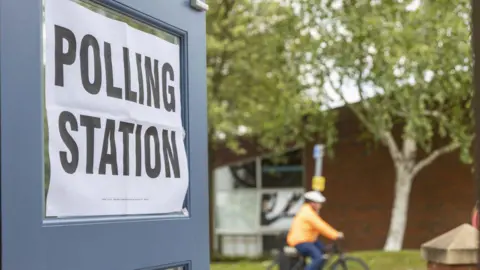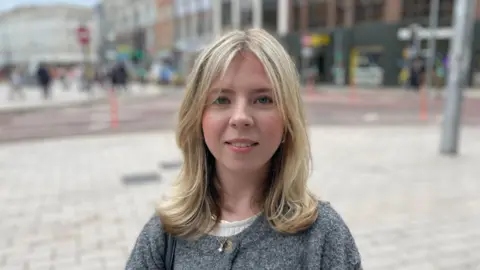Stormont voting to be extended to 16 and 17-year-olds
 Getty Images
Getty ImagesPeople aged 16 and 17 will be able to vote in future Stormont and council elections in Northern Ireland.
However, plans to lower the voting age are unlikely to be implemented in time for the next scheduled Northern Ireland Assembly election in 2027, the Electoral Commission has said.
The UK government has announced a change to the voting age for elections to the House of Commons.
A poll is next due in 2029, whereas Northern Ireland's next assembly and council elections are due in 2027.
Several Stormont parties welcomed the plans to change the voting age, but there have been calls for the change to be made sooner.
The minimum voting age is already 16 for council elections in Scotland and Wales, and elections to the Scottish Parliament and the Senedd (Welsh Parliament).
However for other elections - including to the House of Commons, councils in England all elections in Northern Ireland - it is 18.
An Electoral Commission spokeswoman confirmed the move would apply in Northern Ireland but that it was unlikely to be in place by 2027.
'You're a responsible adult at 16'

In Belfast on Thursday afternoon, people who spoke to BBC News NI supported the move.
Andy Naylor said he agreed as young people's voices count.
"I think you're a responsible adult at 16 if you can donate blood or you're a valued member of society you should be able to give your vote," he said.
He said young people could have a massive sway as, "a lot of parties aren't taking into account the issues that affect young people".
"Especially when it comes to housing, the rates of inflation and how are they supposed to afford a house, a lot of them are having to more abroad or emigrate", he said.

Ellie Ferguson said she thought the decision would be "really beneficial".
"We are growing up in an era where everyone wants to voice their opinions," she said.

Paul Maye said he saw no reason why 16 and 17 year olds should not be allowed to vote.
"Everyone should have a voice on different issues," he said.
"It doesn't matter what age you are."
He said the fact that they lived in Northern Ireland should allow them to vote.
What have Stormont parties said?
The Stormont Assembly has twice supported a motion calling for changes to the voting age - in 2012 and 2024 - but without the support of the Democratic Unionist Party (DUP).
Social Democratic and Labour Party (SDLP) leader Claire Hanna welcomed the voting age being lowered.
"At this age many young people are already out working part-time or contributing to our society in other ways and it's important this has been recognised in the form of voting rights," the MP for Belfast South and Mid Down said.
In a post on X, First Minister Michelle O'Neill said it was a "step forward for democracy and will enable young people to have a say in their future".
O'Neill said she would be contacting the prime minister urging him to ensure the law was changed in time for the 2027 assembly and council elections.
Alliance Party assembly member Sian Mulholland said the "disenfranchisement of our society's young people" had been a "major democratic deficit".
"However, time is of the essence and we need urgent clarification that it will be a priority to see this implemented in time for the next NI Assembly election in 2027. We cannot afford any further delay," she added.
DUP assembly member Brian Kingston said it is "not clear how the government can justifiably set the voting age at 16 rather than the current age threshold".
"The prime minister's rationale for this move is essentially a 'no taxation without representation' argument," he said.
"It is high time the government applied the same logic to Northern Ireland, where taxpayers here have no say on laws imposed by the European Union," Kingston said.
In April, Northern Ireland Secretary Hilary Benn said the government was "absolutely committed" to changing the law in Northern Ireland, but he did not give a timeframe.
The change is part of a raft of measures being introduced through a new Elections Bill, including changes to forms of voter ID and tightening rules on political donations to protect against foreign interference.
The Ulster Unionist Party said it supported votes at 16 and 17 if there were changes to the school curriculum to include political education on how the voting system works.
The party's education spokesperson Robbie Butler said: "We would hope that the amendment to the curriculum, the reduction in voting age and the opportunity for those who have most to gain from good political engagement will encourage as many others to come out and vote as well."
